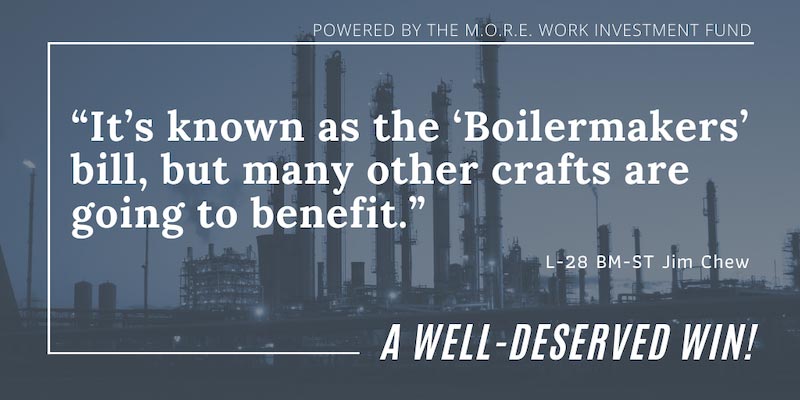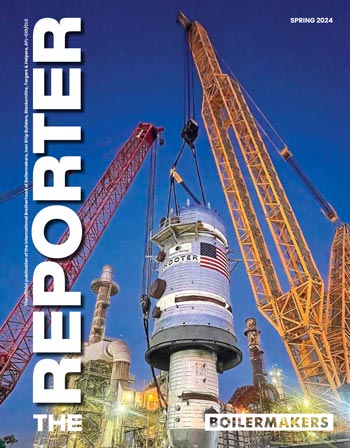Every new victory puts money in our members’ pockets and strengthens the Boilermaker-Blacksmith National Pension Trust and other vital benefits.
Boilermakers scored another major legislative victory under the union’s M.O.R.E. Work Investment Fund August 13 when New Jersey Governor Phil Murphy (D) signed Assembly Bill 805 into law.
A805 mandates that by 2024 at least 60% of workers in certain high-hazard facilities, such as petroleum refineries and chemical plants, be graduates of an approved apprenticeship program or have equivalent experience. The measure also requires that contactors pay the prevailing wage by January 1, 2021 and that workers receive advanced safety training by January 1, 2025.
Boilermakers can expect to see an additional 350,000 man-hours annually in New Jersey’s high-hazard facilities, according to International President Newton B. Jones. Based on an estimated $89.42 hourly journeyman package rate, and factoring 20% overtime, the new work opportunity represents more than $34 million annually that will go on member paychecks and into member benefit programs.
“This is another important win for our union and further evidence that our M.O.R.E. Work Investment Fund strategy is working for our members,” Jones said. “Every new victory puts money in our members’ pockets and strengthens the Boilermaker-Blacksmith National Pension Trust and other vital benefits.
“And, importantly, these new requirements will serve the State of New Jersey and its citizens well by raising the bar for safety and professionalism in the construction and maintenance of high-hazard facilities.”

Martin Williams, National Coordinator of State Legislative Affairs, M.O.R.E. Work Investment Fund, credits the bill’s success to the Boilermakers with help from the New Jersey AFL-CIO and Local 28 (Newark, New Jersey). The bill, first introduced during the 2019 legislative session, made it through the senate, but the session ended before it came up for a vote in the house. Reintroduced this year, the bill passed the New Jersey General Assembly in June.
“This bill will provide better work opportunities and a better outlook for our members,” Williams said.
L-28 BM-ST Jim Chew emphasized that the measure will also help ensure safer working conditions and reduce downtime for facility owners.
“We have a lot of non-union [workers] coming into the area that just aren’t trained,” Chew said. “Before, we’ve had issues of very shoddy maintenance done where people get hurt. With this bill, we’ve tried to nip it in the bud, so our workers are safer; and we can put longevity into these plants, so they don’t shut down for accidents.”
Chew said the inclusion of prevailing wage language in the bill is nearly unheard of for any work except that covered by government contracts. Even if non-union contractors comply with the training aspect of the bill, they’ll still be bound to the prevailing wage.
“That gives our contractors an even playing field. It’s a great opportunity for Boilermakers to gain market share and for our contractors who were being outbid by non-union labor.”
Chew stressed that the work done to get this bill passed was a group effort by many people.
“Bill A805 was a collaborative effort [among] the Boilermakers legislative department, Local 28 and friends in the New Jersey Legislature” with key support coming from assemblyman Anthony S. Verrelli and president of the New Jersey Senate Stephen Sweeney. “If it wasn’t for legislators who sponsored and pushed this bill, it wouldn’t have gotten done. They are great friends to skilled labor in New Jersey.”
Chew also praised L-28 business agent Brian Murphy and New Jersey AFL-CIO President Charles Wowkanech for their tireless work to get the bill passed.
“It’s known as the ‘Boilermakers’ bill,’” Chew said. “But many other crafts are going to benefit.”
This is the third legislative success under the M.O.R.E. Work Investment Fund and won’t be the last, according to Martin Williams. He noted that a similar bill is making its way through the Illinois General Assembly. It passed the state senate last year and is now in house, in its third reading. Williams said it’s “poised for passage,” with the next opportunity in November.
Two similar legislative wins that were powered by the M.O.R.E. Work Investment Fund are already benefitting members in California and Washington. In California, the legislation is expected to result in an estimated 3 million new Boilermaker man-hours per year, over $278 million in wages and benefits annually. It has already yielded more than 1,000 new members and 31 new formerly non-union contractors signed to Boilermaker agreements.
In Washington State, ESHB 1817, signed in May 2019, is expected to generate an estimated 1 million new Boilermaker man-hours per year, over $114 million in wages and benefits annually and is catalyzing new contractor affiliations and recruitment efforts.
M.O.R.E. Work Investment Fund boosts man-hours, covers TWIC cards, training
In addition to fueling Boilermaker-favorable legislative efforts that have seen success in California, Washington, New Jersey and—soon—Illinois, the M.O.R.E. Work Investment Fund has been invested in a variety of tactics that directly benefit Boilermakers’ jobsite requirements and job opportunities.
To date, the M.O.R.E. Work program has covered the cost of several jobsite requirements, including more than 480 TWIC cards, MSHA training courses and DISA background checks as a way to ease the financial burden for Boilermakers and ensure they are ready to go to work. TWIC cards are the Transportation Worker Identification Credentials required by the Maritime Transportation Security Act for workers who need access to secure areas of the U.S. maritime facilities and vessels.
“These are things that if the International Brotherhood of Boilermakers didn’t pay for them, the members would pay out of their own pocket to meet jobsite requirements,” said Tim Simmons, D-CDS, D-NRS, AIP. “Covering the costs is a way to make certain Boilermakers can get on the job and be relieved of the cost burden.”
The M.O.R.E. Work Investment Fund has also fueled successful job targeting efforts that have resulted in a measurable increase in man-hours in several areas, as well as Boilermaker work expansion into new industries.
The M.O.R.E. Work Job Targeting Strategy increases the competitiveness of Boilermaker-affiliated contractors in bidding for jobs, ultimately bringing more work to Boilermakers.
“This is a way to even the playing field in the bidding process and keep the Boilermaker competitive against the non-union sector,” Simmons said. “Our M.O.R.E. Work Job Targeting Strategy helps ensure Boilermakers get more man-hours in a difficult and more competitive environment.”
In the Lone Star District Lodge, job targeting through the M.O.R.E. Work program regained previously lost territory. In 2019, the Lone Star District reported 103,810 in power generation man-hours. With job targeting, as of August 2020, the Lone Star District has already accumulated 117,567 man-hours in power generation—despite disruption from the COVID-19 pandemic.
As of August, job targeting efforts had generated more than 203,000 man-hours for Boilermakers and allowed Boilermaker work to expand further into industries such as paper production and sugar refining.
M.O.R.E. Work Investment Funds are also powering marketing, recruiting and organizing strategies and tactics in all IVP areas.







